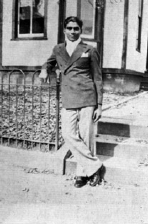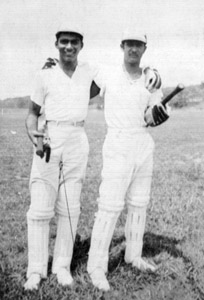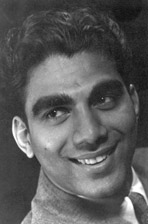Biography of Dr. Cheddi Jagan
Growing Up
by Cheddi Jagan (from "The West on Trial")
“Non-cooperation with evil is a sacred duty.”
Mahatma Gandhi
While there is a lower class, I am in it; while there is a criminal element, I am of it; while there is a soul in prison I am not free in the struggle, the increasing struggle between the toilers and producers and their exploiters. I have tried as best I can to serve those among whom I was born, and with whom I expect to share my lot to the end of my days. Eugene Debs, U.S. Labour Leader
Chapter I
I suppose rebellion is in my blood.
As I look back in my past, one thing stands out most vividly, a perpetual struggle for survival and freedom.
I know very little about my ancestors in India. I presume they were no different from the millions of other peasants to whom it did not matter whether their country was ruled by a Hindu Raja, or a Moghul Nawab, or the British government. I have no doubt that like most other peasants, they were exploited by zamindars (landlords) and were ground down by poverty. Whatever might have been their struggles against the zamindars or the British Raj it would appear that there was no rebel like me on my family tree.
All that I shall ever know about my parents before they reached British Guiana is what is stated in the records of the now defunct Immigration Department. They came from Basti in Uttar Pradesh, about sixty miles from Allahabad, Jawaharlal Nehru's birthplace. They were born in small villages in remote areas of the district. Births were not recorded in India at that time, so the dates of their births are unknown My father's age on arrival in British Guiana was given as two years and my mother's as eighteen months.
The original group which was later to become my family circle in British Guiana was rather small; just five persons in all - two grandmothers, father, mother and an uncle on my father's side.
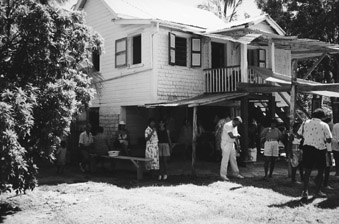
Both of my grandmothers came as indentured immigrants in 1901 on the sailing vessel Elbe They were "bound" by five-year contracts to different sugar plantations, or "estates" as they were called, in the county of Berbice, the most eastern of the three counties which make up British Guiana. My paternal grandmother went to Albion and my maternal grandmother to Port Mourant, three miles away. Women were required to work during the first three years, but for the rest of the period, during which they were required to reside on the plantations, they were under no legal obligation to work. My grandmothers, however, like all the other women who came to British Guiana during the 79 years of Indian indentured immigration, from 1838 to 1917, had no choice but to work throughout the five years. Every penny was needed.
Plantation life in British Guiana was hard. At a very early age, my parents had to join their mothers in the canefields, my father at Albion and my mother at Port Mourant. They both worked in the creole gangs. My mother relates that she had to work from 7 a.m. to 6 p.m. manuring sugarcane in the fields for 8 cents (approx. 2p) per day, and also three times per week from midnight to 6 a.m. fetching fine bagasse into the factory for 4 cents (1p) for the 6-hour period. Her total take-home pay was about 60 cents (I2 ½p) per week. She often recalls how difficult those days were: 'Bhaiya, ahwee proper punish" (Brother, we really suffered). My mother has a way of calling me by the all-inclusive term "brother", a common practice among Indians.
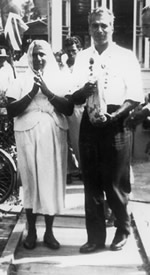
My mother was a short, quiet, thrifty and deeply religious woman, who took care of budgeting our family's life. She endured long suffering with infinite patience. from my mother I learnt the elements of finance.
At about the age of fourteen my father moved to the cane cutting gang and my mother to the moulding gang. The cleaning of trenches was allotted as an additional duty, particularly to women. My mother's earnings increased to 20 cents (4p) per day, and my father's were 36 cents (7½p). But the hours continued to be just as long. The normal practice for workers in this category was to wake up about 4 o'clock in the morning and trek from three to five miles on foot for task assignments.
My parents were married in 1909, when my father was about ten years old and my mother slightly younger. It was still the custom in those days for Indians to marry at a very early age. However, they continued to live separately with their respective parents until about the age of sixteen, when my mother moved in, as was the custom, with her in-laws.(My father's mother had re-married.)
For my mother, this was a step toward a slightly higher status - midway between a room in the plantation range and a separate home. Home in this case meant a small house of two rooms, with two windows and a door, a mud floor and a troolie grass roof. Khatiyas (plaited ropes on wooden crossbars and legs) and boards were the improvised beds.
My mother continued to work until I was about nine years old. By that time, there were already four children in the family. I was the second child and was born on March 22,1918; my elder brother had died at the age of eight months.
Because my father had earned a reputation of being the best canecutter, he was promoted at the age of thirty to "driver" - a foreman of a gang. (The term "driver" which dates back to the days of slavery and the whiplash, has now been modified to that of headman.) But his pay was still low; at first no more than 50p a week (G$2.40). After many years he became head driver, but even then he did not earn very much.

My father had a small pocket but a big heart. He was bold and flamboyant and had a county-wide reputation as a great sportsman, particularly a t cricket, horse racing and betting. He was a tall, fair skinned, impressive looking man with a picturesque and the largest moustache in the county. Any leadership qualities I have, I acquired from my father.
On his retirement at about fifty owing to broken health, he was given the princely sum of G$4 (83 ½p) a week as an ex-gratia pension !
My mother never went to school, but my father was slightly more fortunate. Even so, he had to leave within three years, before he was ten, in order to go out to work. My grandmother could not afford to keep him in school. The sugar planters, concerned with the production of more sugar at less cost, kept wages so low that parents were unable to educate their children, who in large numbers remained more or less illiterate.
The planters frowned upon education because they held the view that an educated worker would soon become dissatisfied with his status as an agricultural labourer. What they needed, above all, was a cheap and abundant supply of agricultural labour. Bookkeepers, storekeepers, dispensers, engineers, and foremen could easily be found from among the freed Africans and the Portuguese.
Government officials, too, more often than not, saw things in the same light as the planters. An Immigration Agent General (an official in whose care the welfare of the workers and their families was placed) recorded in his Administration Report for 1912-13 that it was a privation to prevent children under the age of nine years from being employed on what he called "light work", such as carrying earth, ashes, manure, and he added that "this is not only a benefit to the parents but also a source of pleasure to themselves". The Swettenbam Circular which was issued in June 1904, relieved Indian parents completely of their obligation to send their daughters to school.
My parents were Hindus and deeply religious, my mother even more so than my father. In the early days my mother used to attend the Hindu Temple at Port Mourant and take part in many of the festivals and functions that are part of Hinduism. Hinduism is, of course, not such a formalized religion as many others. One could say it is a way of life. If you are born of Hindu parentage, you do not have to take part in institutional practices to maintain your status as a Hindu. Although my father attended few of the functions, he was as staunch a supporter of his religion as any other person on the plantation. He wore the churki, a bunch of hair between four and six inches long in the middle of the head, which is roughly as significant to a Hindu as a beard is to a Muslim.
As a boy, I remember attending many Hindu festivals - Holi, Deepavali, Kalimai Puja and Ram Leela. At that early age, their religious significance was lost on me, but they were fun, particularly the Holi celebrations. I remember spending weeks with others collecting all the dead trees and pieces of wood we could find to help build the Holi, and then in the early morning of the appropriate day taking part in burning the heap and roasting corn-on-the-cob. There was a particular superstition that corn roasted in the Holi fire would cure toothache.
One particular event I shall always remember took place at the death of my paternal grandmother. My father had to lead the religious ceremony which, in accordance with the Hindu custom, was performed on the thirteenth day after her death. He had to shave his head completely, with the exception of his churki, and as the eldest son of the family, I had to do the same. I did not relish the thought of going about shaven-headed, but I had to do it to please my parents. I did not have a churki, but a bunch of hair was left by the barber to form one which I cut off as soon as the rest of my hair had grown.
What was most interesting about this function was the feeding of the mahapatar, a priest belonging to the lowest division of the Brahmin caste, who officiates principally at such ceremonies. I recall the experience of rubbing his bulging abdomen so that he could consume more food. But food was not all. Gifts of various kinds - a cow, blankets, an umbrella, etc. - were showered upon him. These were necessary for the soul of the dead in the period between death and reincarnation.
The plantation appeared to me as the hub of life. Everything revolved around sugar, and the sugar planters seemed to own the world. They owned the canefields and the factories; even the small pieces of land rented to some of the workers for family food production belonged to them. They owned the mansions occupied by the senior staff, and the cottages occupied by dispensers, chemists, engineers, bookkeepers and drivers. They owned the logies (ranges) and huts where the labourers lived, the hospitals and every other important building. At one time they also owned and operated a rice mill. Even the churches and schools came within their patronage and control.
The plantation was indeed a world of its own. Or rather it was two worlds: the world of exploiters and the world of the exploited; the world of whites and the world of nonwhites. One was the world of managers and the European staff in their splendid mansions; the other the world of the labourers in their logies in the "niggeryard" and the "bound-coolie-yard". The mansions were electrically lit; the logies had kerosene lamps. It was not unusual to hear it said that the mules were better treated than human beings, for the tables had electric light. It was not that electricity could not have been taken to the workers' quarters and residences. The owners could easily have generated more electricity at very little extra cost to satisfy the needs of all. But electricity, like so many other things, was a status symbol.
There is an interesting story about mules being treated better than the workers. Years ago, on first arrival, a director of one of the foreign sugar companies took his wife on a familiarization tour of the estates on the East Bank of Demerara. '"What's that?" the good lady asked. 'That's a mule stable," replied the husband. After a while, as the drive continued, she remarked: "My goodness, you have an awful lot of mules."
Sitting at the apex of this world was the plantation manager. At Port Mourant, the premier plantation in Berbice, the manager during my boyhood was J. C. Gibson. His reputation extended far and wide; he was czar, king, prosecutor, and judge, all in one. Almost everyone looked upon him with awe and fear. The roadside parapet and timber rails of the bridge across the main trench which drained the water from the estate to the sea constituted a regular meeting place, a kind of social centre. Young and old alike sat on the rails, but not when Gibson passed. As soon as he was spotted half-a-mile away, we either had to scamper away or be prepared to do obeisance.
Between these white and non-white worlds there were distances -social (inhabitants of these two worlds did not associate) and physical (the mansions were out of bounds). There was also a psychological distance. I recall vividly my great curiosity about the manager's mansion. I wanted to know what it felt like to be inside the gate. I wanted to know what was going on inside. The opportunity came one Christmas when I must have been about eight or nine years old. I joined the creole gang and went to share in the largesse of the manager. The manager's wife, Mrs. Gibson, stood at the window of the top floor of this imposing mansion. She threw coins down to us and enjoyed seeing the wild scramble for the pennies.
The plantation hierarchy had an unwritten but nevertheless rigid code. Managers and overseers could have sex relations with non-white women, but intermarriage was strictly forbidden. These women were not considered good enough to be wives of whites. Although sexual intercourse between white members of the staff and non-white women was looked upon with disfavour by the Immigration Department, in practice the plantation system was so organised that nothing could be done to prevent it. The head of the Immigration Department was always known as Crosby (after James Crosby, a one-time exceptional holder of the post), but was powerless to help. Various subterfuges were used to avoid detection. When a child was born of an illicit relationship, the name of a driver or some other non-white employee, suitably rewarded, was given as the father of the child when the birth was registered.
Rum-drinking, gambling, dancing, horse and mule-racing, and cricket were the principal pastimes of the whites. Cheating - padding of the paylists -was also practiced on an extensive scale. Plantation life gave me the opportunity of seeing at first hand the raw deal which the labourers received. No doubt these experiences were the factors which led to my early interest in social and economic questions, and brought me later into political life.
Between the worlds of employers and employees was the middle stratum of shopkeepers, pandits, parsons, teachers, dispensers, bookkeepers and drivers, all of whom depended for their status and social position on the patronage of the manager. They could be penalized at any time if they lost favour with him.
My father was at the lowest level of the middle stratum. His position was the source of a real dilemma to him. He felt himself one of the exploited, but as a driver had to carry out the orders of his exploiters. I recall how this grieved him. His way out was publicly to carry out his duties while privately advising and urging the workers on the courses of action open to them.
Having attained the position of driver, my father had no further avenue of promotion, For the unwritten law was that none other than a white man could hold the post of overseer. This was a cause of frustration and bitterness as he had to train white men who did not know the difference between young sugarcane plants and grass.
My father proved his competence at work and at play. In many ways he demonstrated that he was a man equal to, and sometimes better than, those placed above him because of their white skins. The overseers above him were a boorish lot who were barely tolerated by other expatriates in better positions. With little pretensions to education or culture, their social life was restricted to the narrow confines of "wine, women and song". Often they had to turn to drivers and others for company, and at their own pastimes of drinking and cards my father soon outpaced them. He drank more than most, but retained a cool head, and it was not unusual for him to make more money from gambling at cards than from his earnings on the plantation.
These were the ways in which he sought “to break out” of his environment – an environment which arrested his development and which eventually crushed him.
Like most people of the labouring class whose privations began in infancy, disease began to affect my father's health when he was about fifty. However, because he was a man of fine and indomitable spirit, he died fighting to the very end. He refused to agree to the surgeon's decision that his gangrenous foot should be amputated. This might save his life, he was told, but this argument was of no avail; he did not wish to live as a cripple.
The decision against amputation was apparently compounded of many factors, of which two predominated: firstly, folklore - a "half-a-foot" man was an object of derision and fear among children and my father did not wish his grandchildren to be told that he was such a person; and secondly, religious belief - call it superstitious folklore if you wish. Somehow, amputation of a leg did not fit in with the reincarnation theory, a belief that after death the soul enters the body of a newly born child. All of this was told to me rather incoherently when I pleaded with him to agree to the amputation.
If my father could not break out of his environment himself, he sought to do so through me. He saw to it that, the opportunities of which he had been deprived were made available to me. He well knew what the lack of formal education meant, so he made sure that I attended school.
My first school was the Port Mourant Primary School, run by the Anglican Church. The duration of my stay at this school was short. I attended only up to the first standard. One of the reasons I understand was ill treatment. It might well have been that my parents were all too sensitive about the head teacher’ cane. To them, I was the golden boy – my elder brother had died at the age of seven months. But no doubt the fact that the headteacher of the new school was the best among the head teachers of the three schools in the area was the main reason for my transfer.
Most of my primary school days were spent at the nearby Rose Hall Scots School. The headteacher, J. S. Ralph, proved to be a friend and counsellor, took a keen interest and later advised my father to send me to R. N. Persaud's private secondary school in Port Mourant, the only secondary school of its kind in the area. I spent about two years there. In those days, secondary schools were not only few in number but the fees were quite high. I have never forgotten this and the memory of it was clear in my mind when in 1961 while I was Premier, we arranged for the initiation of a comprehensive system of free secondary education.
Then came what was at that time regarded as a major decision. In 1933, at the age of fifteen, my father decided to send me to Queen's College, the government secondary school for boys in the capital city of Georgetown, about a hundred miles away from home, a great distance in those days of very poor roads and slow transport.
My self-confidence was to receive a sharp blow on my arrival in Georgetown. At Port Mourant I had been a big fish in a small pond, a king in my own kingdom. There I was a leader. Emulating my father, of whom I was very proud, I developed leadership quantities very early. I headed my own cricket team and played most of the other games successfully. Kusti (wrestling) allowed me to demonstrate my talents as the best fighter at Ankerville (a section of Port Mourant) and the nearby areas. And prowess at games involving marbles, bows and arrows earned for me the reputation of a banker in buttons, marbles and arrows.
Georgetown was different. There I was a country boy in a big city, a tiny “patwa" in a big pond. At home I had felt the social distance between my parents and even shopkeepers. Here I was suddenly thrown among the sons of "famous" people.
The second blow I received was at the hands of the Principal of Queen's College, Captain H. Nobbs, an Englishman, who placed me in Form II. Two weeks of Form II convinced me that I was wasting my time. I was doing work which I had already covered at Port Mourant. A verbal battle with the Principal resulted in my transfer after two and a half weeks to Form III. At the end of that year came a double promotion. Then, at the end of my second and third years, I passed both the Oxford and Cambridge Lower and School Certificate examinations. These achievements, coupled with a cricket batting record for the college third-eleven team, completely restored my confidence, a pattern of experience which was to be repeated in my later life.
Though Queen's College was a challenge, in many respects it was a disappointment. On the one hand, it was very remote from the life and experience of a boy such as myself; and on the other, it was involved in training a fortunate few, quite without relation to Guiana and realities.
I soon found myself in conflict with the ways in which I had been brought up and with the kind of things I had been doing. At Port Mourant, poverty was intense --- I didn't wear shoes until I was about twelve. From an early age I had to undertake various jobs to supplement the family income. As the combined income of my parents from work in the fields was inadequate even to meet the barest necessities of life, our family diet was not only very simple and modest but also monotonous, consisting of the same items over and over again. Rice and dhal (split peas), occasionally roti (a form of bread) and fish were the principal items. Beef and pork were taboo to us as Hindus. So simple was the diet that I used to look forward to the occasional Saturday night treat of sardines and bread, or cheese and biscuits, with which my father returned from his weekend sprees, either at the "overseer quarters" or at that poor man's club, the village rumshop.
Additional income for the family came from three sources five acres of rice, a few head of cattle and a kitchen garden at the rear of our house. I often had to take time off from school to work in the rice fields at both planting and harvest, and on Saturdays to help my father cut and fetch canes. Cutting grass for our cows, helping with the kitchen garden and at times even selling produce from the latter in the open-air plantation market, became part of my routine. My mother had been clever enough to give me a kind of incentive bonus: she allotted to me part of the kitchen garden and anything produced there was mine.
Any leadership qualities I have I acquired from my father. From my mother I learnt the elements of finance. While my father was bold and flamboyant, my mother tackled the more mundane and difficult task of balancing the family budget.
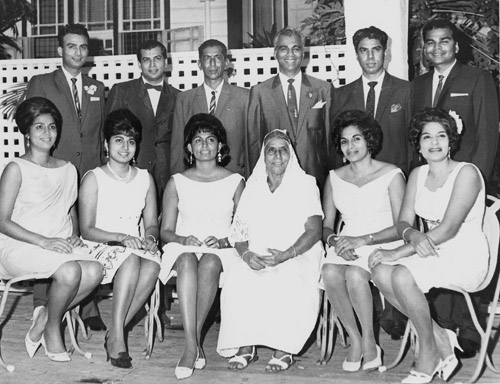
These experiences were to stand me in good stead in later life. In Georgetown and at Queen's College, however, values were different. Here I began to develop a kind of snobbery, entangling myself in the problem of adjustment arising from the process of cultural integration and assimilation that was taking place. For Indians, urbanization had a Western and Christian influence, particularly among the second and third generations, who were torn between the new and dominant mores of the city and the older customs and habits of home, based originally on an oriental way of life, but somewhat modified by time. For example, it is unthinkable today for an Indian family to have a boy wearing earrings as I had to for a few years. Luckily, one of my brothers ended this practice in my family. In a scramble, he snatched off one of my gold earrings and threw it into the trench. My parents did not bother to replace it; the cost must have been an additional consideration. Another example was the practice of Indians taking Christian names, although they were not Christians. In my own family, the names of Derek, Doris, Patricia and Barbara eventually replaced Indian names. In my own case, in my "teens" I adopted my middle name "Berret", for I thought it a fashionable thing to do.
The "clash of cultures" was particularly evident in two of he three families with whom I boarded in Georgetown. In the first family, a beautiful daughter resented the old-fashioned restrictions her father imposed upon her. I became the victim not only of his rigid discipline, but also of his frugality. To compensate him for the small amount of money my father paid for my board and lodging, I had to do many chores such as washing his car, carrying his lunch on my bicycle, going to market, and cutting grass for his goats. I particularly resented the latter. Cutting and fetching grass in the country was one thing; doing so in Georgetown as a Queen's College student was quite another. Georgetown middle-class snobbery had so influenced me that I soon found some pretext to persuade my father to find me other lodgings.
But this change was a case of out of the frying pan into the fire. The new family with whom I stayed belonged to the Kshatriya caste. One of the daughters had married a Brahmin and had three sons and one daughter. So strait-laced were the family elders that the three boys, who also went to Queen's College, became pale imitations of robust boyhood. Two things particularly irked me about my position in this household: firstly, I was singled out to go occasionally to the market; secondly, I had to sleep on the floor, although there was an empty room with a vacant bed. Apparently this was for reasons of status, based on caste-my family caste was Kurmi, lower in status than a Kshatriya or a Brahmin. Until then, although I had heard my mother occasionally mention caste, I had never really encountered it, so I deeply resented this treatment and rebelled against it in many ways.
It was not long before I moved to a third family, who were not Hindus but Catholic converts, and it was here, ironically enough, that I felt really free. This was largely due to the fact that the head of the family was not only a relatively young man, but he had also come up the hard way, from chauffeur to an estate manager to customs clerk in the office of one of the three foreign-owned sugar companies. I suppose, too, that I was growing up.
Apart from these problems of adjustment, I found that Georgetown was different in other respects as well. There were not so many simple pleasures as in the countryside. Looking at my own and other city children, I have always felt that they miss so much. Poverty had been intense at Port Mourant, but simple pleasures were many. Country life was full of rich experiences: perching on the fork of a tree at the centre of the kharian (threshing ground), prodding the oxen to urge them on their seemingly endless tramp-mashing (threshing) of padi; sleeping on padi haystacks under starry skies, even with clouds of mosquitoes buzzing around; watching cows grazing in the reaped padi fields; catching fish with hook and cast-nets; thrusting one's hand into holes along the banks of empty trenches to find sometimes not fish but nonpoisonous water snakes; shooting birds with slingshots; walking barefoot and pitching marbles in muddy puddles; burning the Holi heap and playing "mud" and "abir" at Phagwah time; and attending the August races. The Port Mourant horse and mule races were almost a national institution. Preparations were made for this as if for a great festival. New clothes were purchased, shoes bought by those who had never worn any before, and white yachtings (sneakers) were bravely worn though invariably by the end of the day they were either strung around one's neck or carried home under one's arm. Little wonder that I was highly amused when I later read the definition of a successful U.S. businessman to be "a man who was born in the country, worked like hell to get to the city, and then worked like hell to get to the country."
I was to return to these simple pleasures of country life for another year. Having faced the challenge of Georgetown, I returned home in 1935 relatively unscathed. I was ready and, I thought, qualified for a white-collar job in Georgetown.
Copyright © Nadira Jagan-Brancier 2000
This is the 1st chapter of Dr. Jagan's autobiographical work "The West on Trial"

